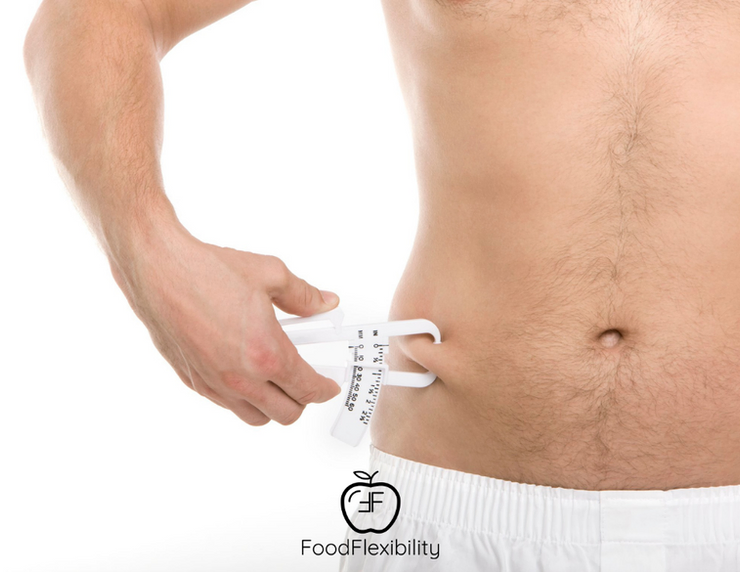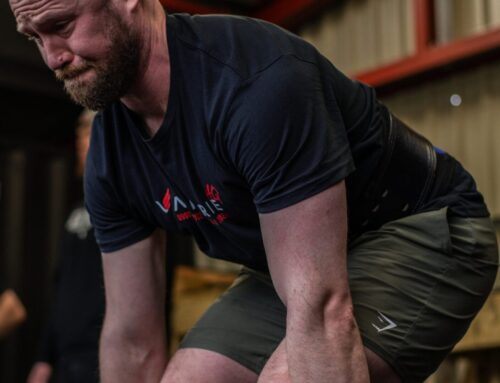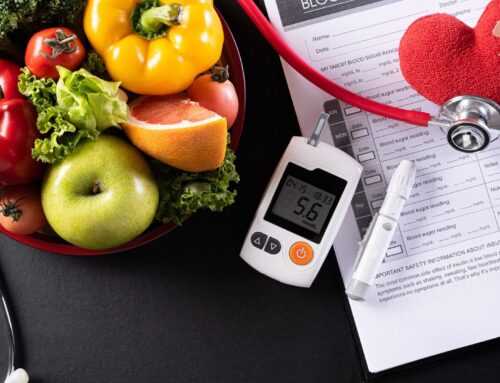In order to gain muscle you need to eat a diet which puts you in a slight calorie surplus, consume adequate protein and train really, really hard.
Where a lot of people fall down is that they eat a little more, lose a bit of definition and think they’re getting fat when actually it’s just water retention messing with your head.

-
Do not lose your s**t at this point and panic 🤯. It’s not possible to gain a significant amount of fat in a single day and practically impossible to gain any fat at all from a single meal!
-
Consuming more carbohydrate is beneficial to performance but it will increase your weight on the scales. This is not fat!
-
Extra carbohydrate and extra salt can lead to temporary water retention. This can lead to you to feeling or looking a bit ‘puffy’ as the water is retained just under your skin. This will pass naturally in a few days
-
Jumping from exercise program to exercise program or from ‘cut’ to ‘bulk’ every week or every month is a sure fire way to keep spinning your wheels for ever
The aim of this blog is to tell you my story, so you don’t make the same painful mistakes that I have.
At the start of my fitness journey, I was a reasonably young man and I wanted a 6 pack.
For no other reason that as a kid growing up I’d always been a bit chubby and unfit and I wanted to look and feel like an athlete.
I had some great success towards the back end of my time at university when I took a ‘gap year’ to go travelling. Getting away from my usual environment helped me break the routine of boozing most nights, sleeping in until midday and eating junk to soothe my hangover. Don’t get me wrong, it was fun at the time and I probably wouldn’t change all that much if I had my time over again. But some ‘time apart’ from the student life really helped me to clean up my diet without the social pressures of bonding over booze with friends.
It’s fair to say I probably didn’t need to fly half way across the world to achieve that, but I’ve never really done things in half measures!
So I lost weight, I looked a bit better and when I came home after 3 months away I got a lot of compliments.
However, I still didn’t feel that great with my shirt off. I’d become ‘skinny with a belly’, as an old fiend of mine used to say…
To cut a long story short, I then fell in love with weight training and that led to me dialling into the detail of my diet. Ultimately that helped me to get really lean, to the point where I could see some abs in just the right light.
But I still didn’t think I looked strong.
“OK, time to build some muscle having ‘done the hard work’…” I thought to myself.
The thing is, I knew I needed eat more to build muscle but it took me a REALLY long time to get comfortable with that.
Each time I upped my calories, I started to look less defined and more ‘puffy’.
I just kept spinning my wheels, eating a bit more, feeling c**p that I’d lost my ‘hard earned’ leanness going back to eating less and repeating that cycle over, and over and over again….
The thing is, that puffiness wasn’t fat. It’s temporary water retention and increased energy storage. The later is exactly what you are aiming for. The former will pass in time, given enough patience.
Right, that’s my slightly rambling story (if you know me, then you know I like a rambling story, especially with a beer in hand…)
So, what’s my point?
To help you from making the same mistakes as me, I’m going to help you understand these ‘water weight’ fluctuations by using the analogy of how a boxer may chose to ‘make weight’ for a fight.

Boxers who fight in a weight class sometimes reduce their salt, fluid and carbohydrate intake for a few days beforehand to temporarily drop a few kilograms for their weigh in.
They get the carbohydrates back in as soon as possible because these get quickly converted to glucose and stored in their muscles as glycogen. The increase in stored glycogen is vital to their performance as is it gives their muscles instant energy. Pretty useful if you want to avoid getting punched in the face (I’d imagine).
If they are to weigh themselves the day after this carbohydrate heavy meal then they may be as much as 3kg heavier the following day, depending on the extremeness of the pre-fight approach. This is because carbohydrate, salt intake and hydration all affects the amount of water you store in your body. This extra stored water shows up as extra weight when the boxer stands on the scales the following morning.
How does this apply to you?
If you have been losing fat you’ll have been in a calorie deficit for some time. Perhaps you’ve been exercising hard too.
Reducing carbohydrates whilst training hard reduces the amount of glycogen you store. This is why our training is not ‘optimal’ when we diet.
Your body converts the carbohydrates you eat to glucose, a small amount of which is then stored in your liver. The rest is then stored in your muscles. This is beneficial, we want to store more glycogen, it’s like the fuel tank in a race car, it provides instant energy fro our muscles to fuel explosive activity like weight lifting, sprinting, cycling up hill etc.
This extra glycogen storage also pulls in lots of water which gets stored just under your skin. This is what gives you that ‘puffy’ look.
Again, this is NOT fat!
If you were to remember one thing from this article:
More stored glycogen = more capacity for performance
Side note:
You may have heard that body fat stores can be used for fuel and you’re quite right. But converting that body fat to something our muscles can use happens too slowly to fuel explosive activity. This means that relying on that stored body fat for fuel is only really useful for ultra endurance athletes. Even then, they would still benefit from having a nice amount of stored glycogen available should they ever want to run up a hill without resorting to crawling up it on their hands and knees (I get that it’s more complex than that 😉)
The following day:
- they weigh in heavy, just like the boxer
- they look a bit ‘fluffy’ or even bloated, just like the boxer
Don’t believe me?
Find a photo of a middleweight boxer at weigh in and then during the fight the next day.
- Which one do the look healthier and more muscular in? – Spoiler, it’s the fight
- Which one do they look objectively ‘leaner’ in – Spoiler, its the weigh in
Take home:
Do not lose your s**t at this point and panic 🤯
It is not possible to gain a significant amount of fat in a single day and practically impossible to gain any fat at all from a single meal!
In this case, the number on the scales has increased because eating extra carbohydrates and salt draw in water which is retained just underneath your skin.
This can lead to you to feeling or looking a bit ‘puffy’ and the weight from the water you are now retaining makes the number on the scales go up.
Both will pass naturally in a few days.
Jumping from exercise program to exercise program or from ‘cut’ to ‘bulk’ every week or every month is a sure fire way to keep spinning your wheels for ever.
My advice:
Give yourself at least 6 moths for a muscle gaining phase. If after 3 months you feel you’ve gotten a bit fat then do a short diet for a couple of weeks to trim down a bit and then go again for 3 more months.
If you can’t handle that without second guessing yourself, hire a coach to make the decisions for you (*cough).
Did that article resonate with you? Have you made those same mistakes in the past or are you still confused. Let me know in the comments below.




[…] Whilst it’s possible to build muscle in a slight calorie deficit with the right programming optimal muscle gain (and sport performance) requires a slight calorie surplus, and that diet should be carb heavy to fuel explosive power (more on that here). […]